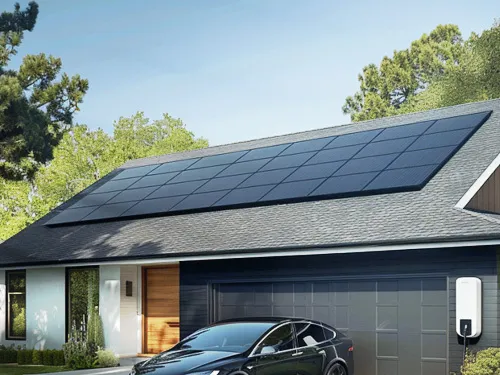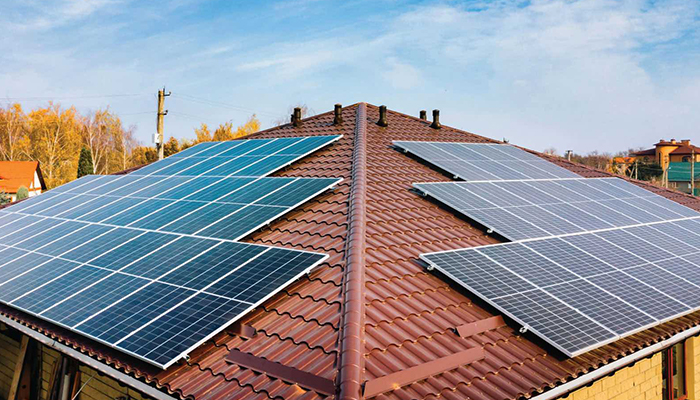Solar energy in India is growing fast. More homeowners are shifting towards renewable power. This change is driven by rising electricity bills, power cuts, and awareness of green energy.
Anúncios
Installing a rooftop solar system in India offers many advantages. It can help save money and reduce your carbon footprint. This article explains the benefits of solar energy for Indian homes, written in simple and easy-to-understand language.

1. Save Big on Electricity Bills
One of the main advantages of solar power is lower monthly bills. A solar panel system converts sunlight into electricity. This reduces how much electricity you take from the grid.
Anúncios
For example, a 3 kW solar system can save about ₹3,000 every month. That’s a saving of ₹36,000 per year. In 25 years, you can save ₹8–10 lakh.
Key solar keywords:
- Solar power savings in India
- Rooftop solar savings
- Home solar installation benefits
2. Government Subsidies and Net Metering
The Indian government supports solar panel adoption. Under schemes like the PM Surya Ghar Yojana, homeowners get financial help. A 3 kW solar panel system can get up to ₹78,000 as a subsidy in 2025.
Net metering policies in India let you sell unused electricity back to the grid. Your electricity bill gets adjusted based on what you export.
Anúncios
Important solar keywords:
- Solar panel subsidy in India
- Net metering benefits
- Solar scheme 2025 India
Also Read Net Metering Policies Across Indian States (2025 Updated Guide)
3. High Return on Investment (ROI)
Solar is a one-time investment. You recover your cost in just 4 to 5 years. After that, the electricity you get is almost free.
Most solar panels work for 25–30 years. This makes it a good investment for long-term savings.
Solar finance keywords:
- Solar investment returns
- Payback period for solar
- Long-term solar benefits India
4. Environment-Friendly Energy
Solar energy is clean and green. It does not release harmful gases or pollute the air.
Using solar power at home means you are reducing your share of pollution. A 1 kW system reduces over 1.5 tonnes of CO₂ every year.
Eco-friendly solar keywords:
- Clean energy India
- Reduce carbon footprint with solar
- Solar panel environmental benefits
5. Relief from Power Cuts
Many areas in India still face frequent power outages. If you add a solar battery backup system, you can run fans, lights, and appliances even when the power goes out.
This is useful in small towns, rural areas, and cities where electricity is unreliable.
Reliable power keywords:
- Solar energy during power cuts
- Backup solar power for homes
- Battery-based solar systems India
6. Low Maintenance Solar Setup
Solar panel maintenance in India is simple. You only need to clean them once or twice a month. The inverter may need a check every few years.
Many inverters come with apps that let you see how much energy is being generated and used.
Solar tech keywords:
- Solar monitoring systems
- Low maintenance energy solutions
- Solar inverter with app monitoring
7. Increase Property Value
Homes with solar systems sell at higher prices. Buyers prefer houses that offer long-term savings on energy. A solar home also looks modern and environment-friendly.
In metro cities, real estate agents report a 5–10% increase in resale value for homes with solar installations.
Real estate + solar keywords:
- Solar homes in India
- Home value increase with solar
- Sell home with rooftop solar
8. Support for Local Economy and Self-Reliance
Buying Indian-made solar panels supports the Atmanirbhar Bharat movement. Companies like Waaree, Vikram Solar, and Tata Power Solar produce panels locally.
India aims to achieve 500 GW of renewable energy by 2030. Every home that goes solar helps reach that goal.
National development keywords:
- Make in India solar panels
- Atmanirbhar Bharat solar
- Indian solar companies 2025
9. Works in All Indian Climates
India gets more than 300 sunny days a year. Solar energy works well in almost all regions—whether it is hot Rajasthan or humid Kerala.
Even on cloudy days, solar panels produce power. Inverters manage power changes automatically.
Regional usage keywords:
- Solar power for Indian weather
- Rooftop solar in humid climate
- Solar energy in Indian states
Real-Life Solar Use in Indian Homes
- In Lucknow, a family installed a 5 kW solar system. Their monthly bill dropped from ₹4,500 to ₹300.
- In Chennai, a homeowner added battery backup to power their house during outages.
- A Bangalore resident uses solar energy to charge their electric scooter daily.
FAQs: Solar Energy Benefits for Indian Homeowners
Q1: How much money can solar save in India?
A: A 3 kW system can save ₹2,500–₹3,500 per month depending on the location and usage.
Q2: Is solar energy good for apartments?
A: Yes, if the society allows rooftop access or installs a shared solar system.
Q3: What is the life of a solar system in India?
A: Good quality solar panels last 25–30 years. Inverters may last 8–12 years.
Q4: Do solar panels work in the monsoon season?
A: Yes. They still produce power, though slightly less than on sunny days.
Q5: Can solar run an air conditioner or geyser?
A: Yes. A correctly sized system can handle high-power devices. Always check your load before installation.
Conclusion
Solar energy in India is no longer the future—it is the present. Homeowners benefit from lower bills, government subsidies, long-term savings, and eco-friendly living.
Whether you live in a city or a village, switching to rooftop solar panels in 2025 is a wise decision. With prices dropping and new government support, there has never been a better time to invest in solar.
Start your journey today and enjoy the benefits of solar energy for Indian homes for the next 25 years.
Author- Ayush











